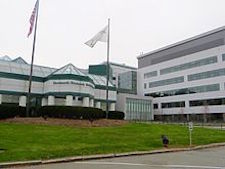
Dartmouth-Hitchcock Medical Center, Lebanon, N.H., the main teaching hospital of the Geisel School of Medicine at Dartmouth College.
Dan Beckham writes here about how academic medical centers can maintain their competitive edge in these risk-and-value-based times — through marketing their differences compared to other kinds of hospitals.
He identifies four key competitive advantages:
“Depth and breadth of capability. Academic medical centers, because of the depth and breadth of their specialty capabilities as well as their commitments to research, are well-positioned as the preferred resources for complex care.”
“Collegial commitment: Faculty physicians in academic medical centers tend to have a stronger sense of shared purpose and common values than do the physicians who comprise the medical staffs of most community hospitals.”
“Proximity. Academic medical centers concentrate lots of talent and resources in close proximity. In this, they are like cities. Cities enjoy significant efficiencies as well as economies of innovation.”
“Loose coupling. This describes elements that retain a comparatively high level of independence despite operating as part of a broader system or organization. The strength and relative autonomy of departments in academic medical centers result in their operating as loosely coupled organizations.”





